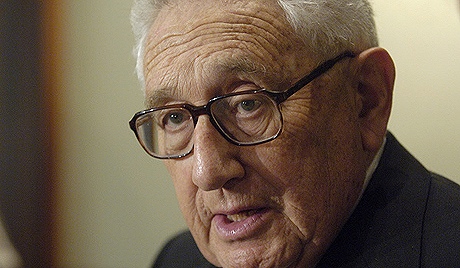
 Shuttle diplomacy guru Henry Kissinger is celebrating his 90th birthday. Born on May 27th 1923, Kissinger served as National Security Advisor and later as Secretary of State. A controversial figure in world politics, he is described as "open” and "smart” by some experts, and a "mass murderer” by others, who blame him for causing numerous casualties in Vietnam and for the bombardments of Cambodia. Even though Dr.Kissinger retired in 1977, he remains an influential figure in world politics. The Voice of Russia’s Anna Khrustaleva reports.
Shuttle diplomacy guru Henry Kissinger is celebrating his 90th birthday. Born on May 27th 1923, Kissinger served as National Security Advisor and later as Secretary of State. A controversial figure in world politics, he is described as "open” and "smart” by some experts, and a "mass murderer” by others, who blame him for causing numerous casualties in Vietnam and for the bombardments of Cambodia. Even though Dr.Kissinger retired in 1977, he remains an influential figure in world politics. The Voice of Russia’s Anna Khrustaleva reports.Despite his advanced age, Henry Kissinger is as active as ever – he is a member of the Bilderberg Group’s committee and is the founder and chairman of Kissinger Associates. "There can’t be a crisis next week, my schedule is already full” is his most popular saying which is known all over the world. Kissinger’s sense of humor is unmatched. Valentin Zorin, a veteran TV analyst and radio observer, recalls that he always took pleasure in talking to Kissinger.
"Not seeing eye to eye on a large number of issues, we would argue for hours, but Kissinger invariably ended the discussion with a humorous remark, or an anecdote. In this way, the dispute, even if a heated one, did not leave any ill feeling".
Henry Kissinger was at the helm of US diplomacy between 1973 and 1977. The term ‘shuttle diplomacy’ sprang up thanks to his endless trips to all corners of the world. Kissinger pioneered the policy of détente in the no-easy relationship with the Soviet Union. The Strategic Arms Reduction Treaty was born out of this policy marking the beginning of the end of the Cold War. Guided by specific principles and a concrete agenda, Henry Kissinger pursued a prejudice-free policy which was devoid of ideological propaganda. Once set on a certain agenda, he saw it through no matter what. His opponents deem him a war criminal for masterminding military coups in Latin America, ordering the bombing of Cambodia and running the military campaign in Vietnam. Paradoxically, Kissinger was awarded the Nobel Peace Prize for the Paris Peace Accords on "Ending the War and Restoring Peace in Vietnam”. TV host Sergei Brilev says Vietnam was Kissinger’s biggest failure.
"Several years later, after the North Vietnamese Army gained victory in South Vietnam and the Viet Cong stormed the Presidential Palace in Saigon, Kissinger’s achievements on Vietnam lost their value and the ‘father of shuttle diplomacy’ could do nothing about it".



_jpg/250px-ElbeDay1945_(NARA_ww2-121).jpg)





